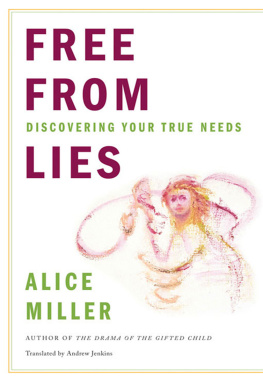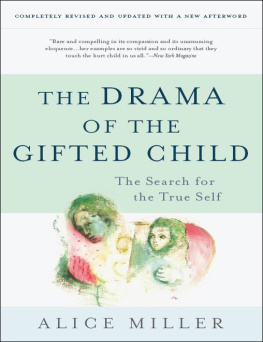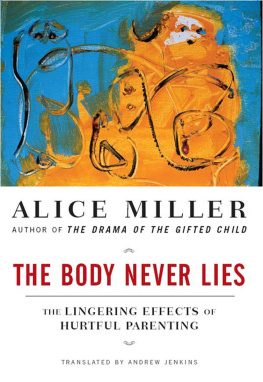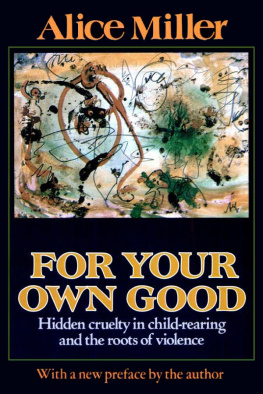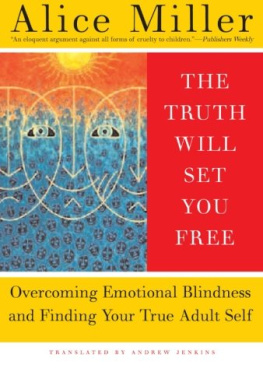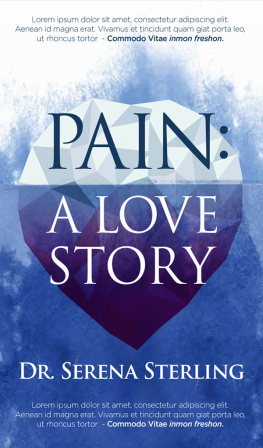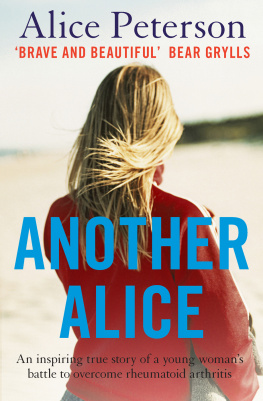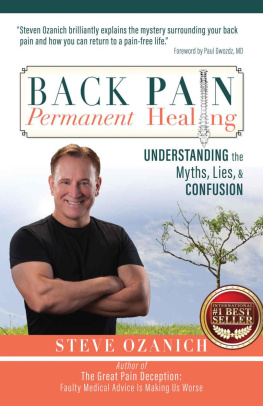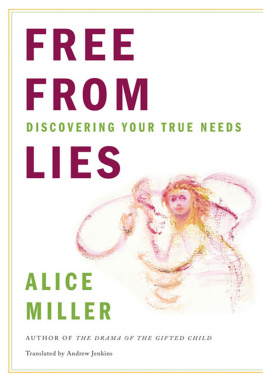Alice Miller - Free from Lies : Discovering Your True Needs
Here you can read online Alice Miller - Free from Lies : Discovering Your True Needs full text of the book (entire story) in english for free. Download pdf and epub, get meaning, cover and reviews about this ebook. year: 2010, publisher: W. W. Norton, genre: Religion. Description of the work, (preface) as well as reviews are available. Best literature library LitArk.com created for fans of good reading and offers a wide selection of genres:
Romance novel
Science fiction
Adventure
Detective
Science
History
Home and family
Prose
Art
Politics
Computer
Non-fiction
Religion
Business
Children
Humor
Choose a favorite category and find really read worthwhile books. Enjoy immersion in the world of imagination, feel the emotions of the characters or learn something new for yourself, make an fascinating discovery.
- Book:Free from Lies : Discovering Your True Needs
- Author:
- Publisher:W. W. Norton
- Genre:
- Year:2010
- Rating:3 / 5
- Favourites:Add to favourites
- Your mark:
- 60
- 1
- 2
- 3
- 4
- 5
Free from Lies : Discovering Your True Needs: summary, description and annotation
We offer to read an annotation, description, summary or preface (depends on what the author of the book "Free from Lies : Discovering Your True Needs" wrote himself). If you haven't found the necessary information about the book — write in the comments, we will try to find it.
Free from Lies : Discovering Your True Needs — read online for free the complete book (whole text) full work
Below is the text of the book, divided by pages. System saving the place of the last page read, allows you to conveniently read the book "Free from Lies : Discovering Your True Needs" online for free, without having to search again every time where you left off. Put a bookmark, and you can go to the page where you finished reading at any time.
Font size:
Interval:
Bookmark:
Also by Alice Miller
The Body Never Lies: The Lingering Effects of Hurtful Parenting
The Drama of the Gifted Child:
The Search for the True Self
(originally published as Prisoners of Childhood)
For Your Own Good:
Hidden Cruelty in Child-Rearing and the Roots of Violence
Thou Shalt Not Be Aware:
Societys Betrayal of the Child
Pictures of a Childhood:
Sixty-Six Watercolors and an Essay
The Untouched Key:
Tracing Childhood Trauma in Creativity
and Destructiveness
Banished Knowledge:
Facing Childhood Injuries
Breaking Down the Wall of Silence:
The Liberating Experience of Facing Painful Truth
Paths of Life:
Seven Scenarios
The Truth Will Set You Free:
Overcoming Emotional Blindness
Discovering Your True Needs
Translated by Andrew Jenkins

W. W. Norton & Company
New York London
Copyright Suhrkamp Verlag Frankfurt am Main 2007
Copyright for the English translation: Suhrkamp
Verlag Frankfurt am Main 2009
Originally published in German as Dein gerettetes Leben
All rights reserved
For information about permission to reproduce selections from this book, write to Permissions, W. W. Norton & Company, Inc., 500 Fifth Avenue, New York, NY 10110
Library of Congress Cataloging-in-Publication Data
Miller, Alice.
[Dein gerettetes Leben. English]
Free from lies: discovering your true needs / Alice Miller;
translated by Andrew Jenkins.
p. cm.
Includes bibliographical references.
ISBN: 978-0-393-07268-6
1. Psychological child abuse. 2. Adult child abuse
victimsPsychology. 3. Psychotherapy. I. Title.
RC569.5.P75M56 2007
616.85822390651dc22
2009007816
W. W. Norton & Company, Inc.
500 Fifth Avenue, New York, N.Y. 10110
www.wwnorton.com
W. W. Norton & Company Ltd.
Castle House, 75/76 Wells Street, London W1T 3QT
I
T HE E XILED S ELF
II
F ROM V ICTIM TO D ESTROYER
III
T HERAPY: R ESOLVING THE C ONSEQUENCES OF E ARLY C RUELTY
IV
I NTERVIEWS
V
F ROM THE D IARY OF A M OTHER
T HERE IS STILL a widespread belief that children are incapable of feeling: either the things done to them will have no consequences at all, or those consequences will be different from what they would be in an adult. The simple reason advanced for this belief is that they are still children. Only a short while ago it was permissible to operate on children without giving them an anesthetic. Above all, the custom of circumcising boys and girls and subjecting them to sadistic initiation rituals is still quite normal practice in many countries. Blows inflicted on adults count as grievous bodily harm or torture; those inflicted on children go by the name of upbringing. Is this not in itself sufficient and incontrovertible proof that most people have suffered serious brain damage, a lesion or a gaping void where we would expect to find empathy, particularly for children? Effectively, this observation is evidence in favor of the theory that all those beaten in childhood must have sustained subsequent damage to the brain, as almost all adults are more or less impervious to the violence done to children!
In my quest for an explanation of this fact, I decided in 2002 to find out at what age parents thought they might begin impressing the necessity of good behavior on their children by giving them little smacks and slaps. As there were no statistics available on this point, I instructed a survey institute to ask one hundred mothers from different strata of society how old their children were when they first decided it was necessary to make them behave better by administering slaps to their hands or bottoms. The responses were extremely enlightening. Eighty-nine of the women were almost unanimous in saying that their children were about eighteen months old when they first inflicted physical correction on them. Eleven mothers were unable to recall the exact age, but not one of them said that she had never struck her child.
These findings were published in the French journal Psychologies the same year. But they aroused no reactions of any kind, neither incredulity or indignation. My conclusion from this is that such treatment is widespread and its justification hardly ever challenged. The question it posed for me was what actually happens in the brain of a child exposed to smacking at such an early age. Though the pain inflicted may not be severe (at least we assume this to be the case), children will surely register the fact that they have been attacked by the very person they instinctively expect to protect them from attacks by others. This is bound to cause ineradicable confusion in the infant brain, which at this stage is not fully formed. Such children will inevitably wonder whether their mother is there to protect them from danger or is in fact a source of danger herself. Accordingly, they will adjust to the situation by registering violence as something normal and integrating it as such into their learning processes. What remains is fear (of the next blow), distrust, and denial of the pain inflicted on them.
What also remains is something I refer to in my book The Truth Will Set You Free as mental blockades . Later, in adulthood, the combination of infant confusion and the denial of suffering obviously instills reluctance or downright refusal to reflect on the problem posed by inflicting physical punishment on small children. Mental blockades (and the fear underlying them) prevent us from asking ourselves how this confusion originated in the first place. Accordingly, we fend off everything that would lead to such reflection.
As far as I know, what infants feel when they are physically attacked and the effects that the suppression of these feelings have on the life of individual adults and the whole fabric of society are issues that have never been addressed by philosophers, sociologists, or theologians. The lengths to which the evasion of these issues has gone struck me with full force recently when I was reading a superbly written and highly informative book on the subject of anger. The book describes with minute precision the disastrous effects of anger directed at scapegoats in the course of history. But nowhere in these four hundred pages is there any reference to the origins of such anger. At no point does the author indicate that the anger felt by every individual person stems from the primary, justified anger of the small child at the blows inflicted on it by the parents. The immediate expression of that anger is suppressed, but at a later stage this suppressed fury will be directed at innocent victims with uninhibited savagery.
As the torture of children and the suppression and denial of that torture are so widespread, one might assume that this protective mechanism is part of human nature, that it is designed to spare us pain and hence plays a salutary role. But there are at least two facts that militate against this interpretation:
First, the fact that suppressed abuse is passed on to the next generation so that the progression of violence cannot be halted; and second, the fact that remembrance of the abuse we have been subjected to causes the symptoms of illness to disappear .
The established fact that the discovery of our own childhood sufferings in the company of an empathic witness (see pages 2627 and 51) leads to relief from physical and mental symptoms (such as depression) forces us to look for an entirely new form of therapy. Unlike the denial of these sufferingsa recourse typically advocated by therapistsit is in fact the confrontation with our own painful truth that leads to liberation.
Font size:
Interval:
Bookmark:
Similar books «Free from Lies : Discovering Your True Needs»
Look at similar books to Free from Lies : Discovering Your True Needs. We have selected literature similar in name and meaning in the hope of providing readers with more options to find new, interesting, not yet read works.
Discussion, reviews of the book Free from Lies : Discovering Your True Needs and just readers' own opinions. Leave your comments, write what you think about the work, its meaning or the main characters. Specify what exactly you liked and what you didn't like, and why you think so.

